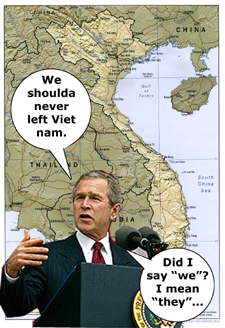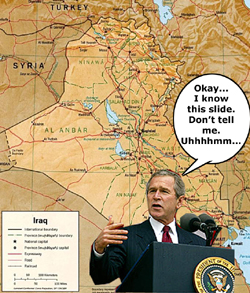I feel like Rip Van Winkle in reverse; like I’ve awoken years in the past instead of years in the future. Dubya Bush going from VFW to military academy assembly selling the Iraq war. Democrats hedging their positions, hoping to land on the  winning side. Pro-war ad campaigns funded by arch-reactionary swift-boaters. Improbably optimistic National Intelligence Estimates, at least in their highly redacted declassified form. What is this, 2002? Are we starting from scratch yet again? This is the product of our political culture’s “ballgame” approach to foreign policy adventures, wherein the central question becomes “will it succeed?” Is this the question we ask when someone commits murder and holds a family hostage? Do we console our consciences with the notion that, well, he did kill that old man and that baby, but at least he’s finally got that household under control? (Right – before someone jumps all over my shit, let me make it clear that I don’t consider our troops to be the “murderer” here. They are the weapon, the instrument of policy that is initiated by our democratically elected leaders, so ultimately it is we who bear responsibility for what they are ordered to do.)
winning side. Pro-war ad campaigns funded by arch-reactionary swift-boaters. Improbably optimistic National Intelligence Estimates, at least in their highly redacted declassified form. What is this, 2002? Are we starting from scratch yet again? This is the product of our political culture’s “ballgame” approach to foreign policy adventures, wherein the central question becomes “will it succeed?” Is this the question we ask when someone commits murder and holds a family hostage? Do we console our consciences with the notion that, well, he did kill that old man and that baby, but at least he’s finally got that household under control? (Right – before someone jumps all over my shit, let me make it clear that I don’t consider our troops to be the “murderer” here. They are the weapon, the instrument of policy that is initiated by our democratically elected leaders, so ultimately it is we who bear responsibility for what they are ordered to do.)
In his speech to the VFW, Bush drew some analogies between the Iraq war and the wars in Korea and Vietnam. (I should say his speechwriters drew the analogies, since he clearly knows nothing about U.S. foreign policy, past or present.) One point was that, like Vietnam and Korea, Iraq is an “ideological” struggle. This is truer than he knows. Both Korea and Vietnam – while very different wars – were fought over the establishment of a U.S.-led global economic system. Iraq was invaded to breathe life into that same superannuated imperial body. The “ideology” of which Dubya speaks was perhaps best articulated by his father – “What we say goes.” That position faces the opposing ideology of “yankee go home.” We fight for freedom – the freedom to do what we want with other people’s lives and property. They fight for, as Robert Fisk puts it, “freedom from us.” So in that way Bush is unintentionally correct, though he and his conservative pundit supporters (like the little fuck on the PBS News Hour) appear to know nothing about the Vietnam war (nor, apparently the Iraq war).
 The rest of Bush’s selling points are just laughable, frankly. Grim as the situation is, I couldn’t resist a guffaw when I heard Dubya tossing around that hallucinogenic contention about how we left Vietnam too soon. (Strange argument for someone who did his level best to avoid going there himself.) He raised the specter of the “boat people” and the “killing fields” that await our departure from Iraq. Not sure if he’s quite been paying attention over the last four years, but that scale of human catastrophe has already been taking place in the unfortunate land he chose to invade, with more than 2 million external refugees, a similar number of internal refugees, and between 500,000 and 1 million killed, plus god knows how many grievously wounded, orphaned, widowed, etc. This is an upheaval easily on the scale of that which accompanied and followed our criminal invasion and destruction of Indochina. (See journalist Nir Rosen’s recent articles for some on-the-ground reporting on this.) So since what Bush claims to be his worst fears have already been realized, why are we staying in Iraq?
The rest of Bush’s selling points are just laughable, frankly. Grim as the situation is, I couldn’t resist a guffaw when I heard Dubya tossing around that hallucinogenic contention about how we left Vietnam too soon. (Strange argument for someone who did his level best to avoid going there himself.) He raised the specter of the “boat people” and the “killing fields” that await our departure from Iraq. Not sure if he’s quite been paying attention over the last four years, but that scale of human catastrophe has already been taking place in the unfortunate land he chose to invade, with more than 2 million external refugees, a similar number of internal refugees, and between 500,000 and 1 million killed, plus god knows how many grievously wounded, orphaned, widowed, etc. This is an upheaval easily on the scale of that which accompanied and followed our criminal invasion and destruction of Indochina. (See journalist Nir Rosen’s recent articles for some on-the-ground reporting on this.) So since what Bush claims to be his worst fears have already been realized, why are we staying in Iraq?
This is old wine in new bottles, folks. We are not wanted in Iraq, we have no right to be there, and we should leave with all deliberate speed. Once we get that underway, we can talk about reparations… and accountability.
luv u,
jp
